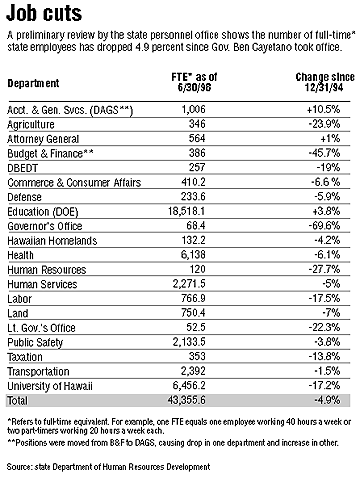

It’s my job
Even in a bad economy,
By Rob Perez
laying off workers
is difficult
Star-BulletinTHE worst fiscal crisis in Hawaii's history forced the state a few years ago to start taking the unusual step of laying off workers.
One reason it's so unusual is because it's so difficult to do -- at least with regular, full-time workers.
State and county employees enjoy such a high degree of job security, especially after working only two years, that some observers wonder whether the system promotes inefficiencies.
In some cases, employees with at least two years service cannot be laid off unless the staff cutbacks are "jurisdiction wide," affecting more than just that department, according to the public-sector union contracts.
And the affected workers must be given plenty of advance notice, typically ranging from 45 days to one year.
Even then, the likelihood of job loss -- especially for senior workers -- is low because of a practice called bumping.
Workers whose positions are eliminated can bump less-senior workers from other positions within the same bargaining unit. The workers getting the new positions must meet the minimum qualifications for those jobs. The bumped workers can in turn bump others of lesser seniority.
That practice has come under fire because, critics say, it sometimes results in the better workers losing jobs simply because they have less seniority. It also results in workers getting jobs they never applied for and for which the employer never picked them.
"It's just not a good system," said Bob Fishman, former managing director for the county of Honolulu.

Bob Frey, dean of students at Radford High School, said the school has lost excellent, enthusiastic young teachers because they were bumped by teachers from other schools who weren't really interested in being at Radford."To me the union has gone to the max to protect old members even though that's not always to the benefit of the kids and school," said Frey, a long-time member of the teachers' union.
Union representatives say the process is fair because personalities and other subjective factors are not used to select affected workers.
"To lay off people, the process has to be fair and blind," said Randy Perreira, field services officer for the Hawaii Government Employees Association.
For the most part, Perreira said, workers who have been bumped into other positions do well after a transition period. "They certainly have the skills and, given an orientation period, are performing fine."
When workers are bumped to lower positions to avoid a layoff, they retain their higher salaries.
Critics say such an arrangement reduces the savings in a government restructuring.
"There's no real incentive to reorganize or demote someone because from a financial standpoint, you don't make much headway," said Lowell Kalapa, president of the Tax Foundation of Hawaii.
Since Gov. Ben Cayetano took office in December 1994, 572 employees have been affected by staff cuts, according to the Department of Human Resources Development. Of those, 427 were placed in vacant positions or bumped others from jobs.
Another 145 regular civil service employees lost their jobs, including 40 who resigned or retired after receiving their pink slips, the administration said. The majority of the 145 had less than two years service, said James Takushi, the state's human resources director.
Despite such action, critics say public-worker job security is excessive, especially because the security is not linked to performance standards.
Some former managers say even unproductive workers keep their jobs because the dismissal process takes so much time and resources.
"Government should not be a guaranteed employment service," said Jack Lewin, a former Health Department director.
But Russell Okata, HGEA's executive director, said workers need job security so they can carry out their duties -- often involving enforcement or interpretation of law -- without fear of being fired for political reasons. "The theory is you're not beholden to anyone."
Even when workers are destined to be laid off, they often have benefits typically not found in the private sector.
If University of Hawaii faculty members lose their jobs, for example, they must be given as much as one year's notice, according to the faculty union contract.
And until they leave, the affected faculty can be released from duty up to half time "to facilitate the pursuit of opportunities for retraining," the contract says.